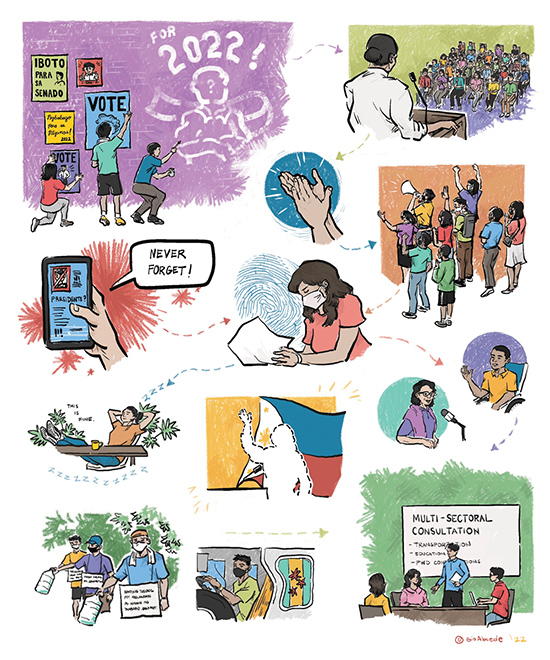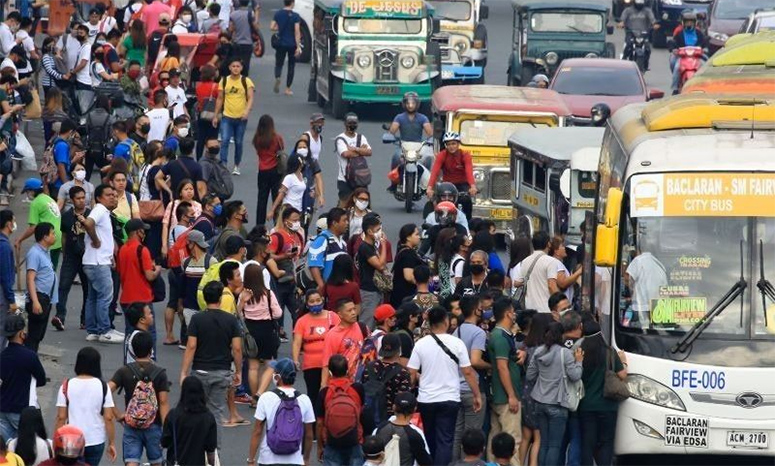Why merely voting is not enough
There is a certain hype during election season.
Have you ever wondered why the months before elections have this weird buzzing excitement in the air? We eagerly anticipate who’ll file their candidacies. We often tag our preferred candidates in our tweets and posts, urging them to run for office. This year, we even have our own hashtag and volunteer movements for our “not-so-official-candidates” in both opposition and administration camps.
It appears to me that as new politicians get inducted into office, a general nonchalance replaces the hype. The adrenaline rush wears off and people settle back into their quiet existence.
All of a sudden, people care. Social issues are increasingly the topic of inumans and “parlor sessions.” We hear people talk about “track record,” “political legacy,” and other buzzwords even in the most unexpected places—salons, sari-sari stores, even in public restrooms. All of a sudden, politicians (formerly silent) start to take stances on controversial issues.
Then voting happens and it’s all gone.

A lot of people who argued passionately about their candidates’ stances on issues suddenly don’t care anymore. Boycotted businesses are re-patronized. Social media is purged of political content, replaced by memes and cute cat stuff again. It appears to me that as new politicians get inducted into office, a general nonchalance replaces the hype. The adrenaline rush wears off and people settle back into their quiet existence.
We often delegate voting as the ultimate practice of democracy.
This is not a bad thing in itself, but many of us often just begin and end our civic participation during elections. After the votes have been cast and the winners proclaimed, we’re back to our own bubbles. But if we genuinely care for our country, we need to pop those bubbles and be involved beyond elections.
Here are the reasons why merely voting is not enough:
Elections-centered democracy punishes our sectors.
Who enjoys these arrangements? Politicians who have nothing to offer but good personality-based campaigns—budots on national TV, musical films of one’s life story and other nonsense gimmicks.
Meanwhile, who suffers? Our sectors.
Personality politics curses our communities. Sectoral agendas (ending hunger, poverty, unemployment, traffic, unaffordable healthcare, unjust labor conditions, among others) are always discussed secondary to the life stories of political candidates. Often, it’s these life narratives, not platforms, that are showcased as the reason why they’re worthy to be elected in office. Many politicians consult sectors for “token support,” championing causes during campaign season, only to drop them as soon as the election cycle ends.
This electoral behavior is already seen in school politics. People who are more fun, pretty, handsome, or funny usually get the votes. It doesn’t matter if their platforms are empty, as long as they can captivate a crowd. Thus, we grew up doubting if we could even demand better.
Many of us are now fighting for what we deserve, but it’s difficult to ask others to join us when media and marketing firms are hell-bent on preserving personality politics. Messages are still concentrated on electoral participation, with little introduction on other democratic processes that citizens can engage in.
Except for voting, democratic processes remain accessible only to the elected.
Take the budget process, for example. Many of our elected people demand Excel sheets and budget computations from sectoral representatives, instead of inviting them into conversations and listening to what the sectors actually need. Coming up with “budget documents” is not the job of the sectors, but of elected officials employed by our taxpayers’ money to design the budget that our people deserve.
Drafting policies is another example. Many of our elected politicians demand data-backed policy papers, sometimes even with law citations. And they ask this from farmers, from fishermen, from indigenous communities. This is not inherently wrong, but when formal documents become a requirement for civic participation, you make it almost impossible for the most affected sectors to send official feedback.
Lastly, we’re also referring to how even non-elected seats in councils are limited to political appointees. In transport institutions alone, they are occupied by able-bodied male lawyers, engineers, members of political dynasties and businessmen. Many are affluent, those who’ve never actually commuted in their entire lives. Many are car owners who never had to climb up steep and inaccessible overpasses.

People occupying these seats are not transport workers who lost their livelihood for more than a year during the public transportation ban. They are not daily wage earners who were fired for not reporting on-site on time. They are not persons with disabilities who need to figure out how to climb overpasses or cross highways in wheelchairs and crutches. The people in power often do not have the necessary experience to design humane policies and equitably distribute the national budget.
Our intense focus on elections is distracting us from fixing the larger problems in our society.
This needs to change. Let us aim for an issue-based democracy.
Beyond elections, organize with the sectors and demand processes to be more accessible for everyone. The People’s Budget Coalition, for instance, are public finance analysts, policy researchers, community organizers, and representatives from our sectors (jeepney drivers, union organizers, teachers, students, health care workers, urban poor, among many). They are working together to co-design the 2022 budget that is responsive to what our sectors need. And there are many others.
An issue-based democracy removes the focus on our politicians’ showbiz lives and allows our people to look at our deeply rooted social problems instead.
The ultimate form of democracy for me is not when politicians represent sectors in congress hearings, when they “consult” us on policy proposals, or when candidates champion sectoral causes during campaigns and debates. These are bare minimum actions.
Democracy is when sectors do not need someone else speaking for them because they can represent themselves in congress through a genuine party-list system.
Democracy is when sectors can co-design budgets and policies that reflect what their communities need because these processes are accessible to those without formal education. The involvement of sectors must go beyond token consultations, but genuine participation in democratic processes.
Democracy is when sectors are also seated in governance — in technical working groups, in committees, in multi-sectoral councils, among many. It’s when jeepney drivers co-create the PUV Modernization Program so it doesn’t leave them behind. Or when persons with disabilities co-design wider sidewalks and ground-level pedestrian lanes to make these accessible for them, too.
An issue-based democracy removes the focus on our politicians’ showbiz lives and allows our people to look at our deeply rooted social problems instead. Leaders would run, not with gimmicks, budots or musicals in mind, but a clear plan of action in making the country a better place. And we can start creating this democracy in 2022. Vote for politicians who have sectoral plans in mind and hold them accountable to deliver afterwards.
The power to govern is not solely owned by those with political positions. The power to govern rests with us—voters, communities, and sectors.
Demand better. Ask for more. Dream deeper.
Check out our collection of thought pieces on #TheLeaderWeNeed in Untemplated: Our Future Now.


